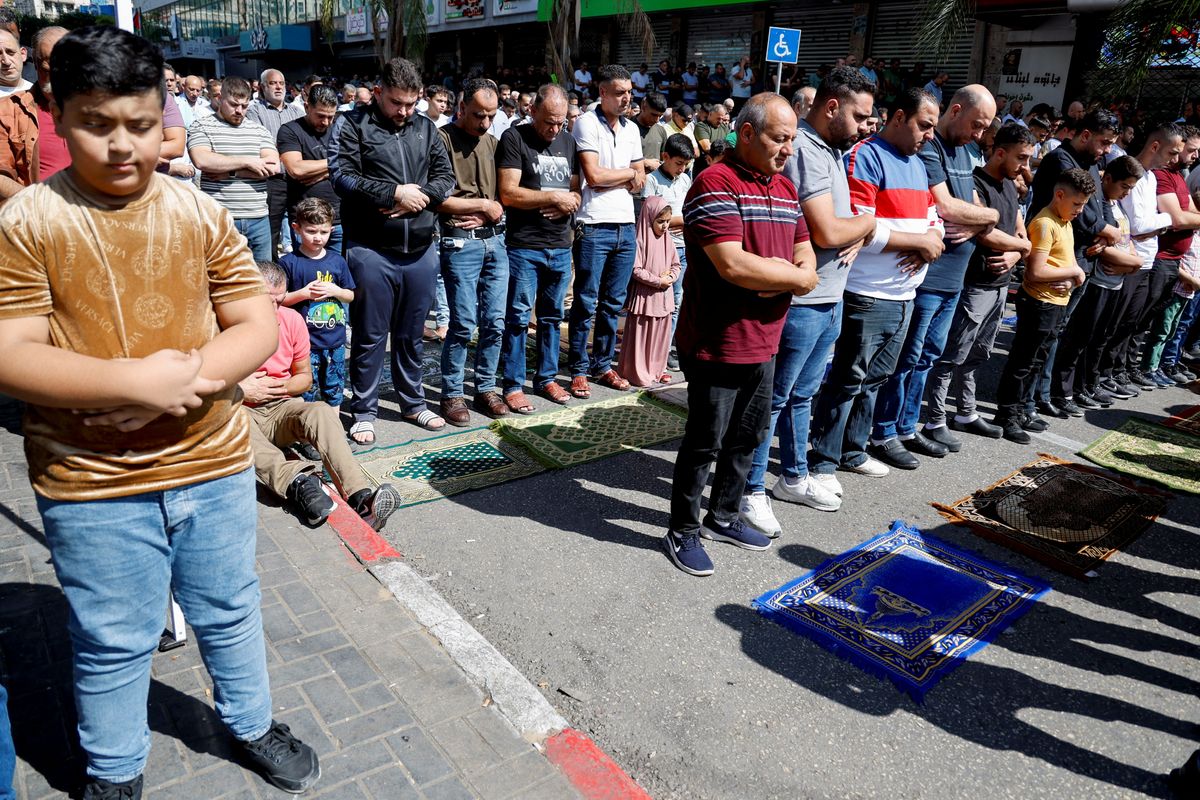With all eyes on Gaza, what’s going on in the West Bank?
Since last Saturday, a devastating conflict has been playing out in Gaza and Israel, but the West Bank is also being affected.

A few minutes every morning is all you need.
Stay up to date on the world's Headlines and Human Stories. It's fun, it's factual, it's fluff-free.
The backstory: There are two major Palestinian territories – Gaza and the West Bank. Separated entirely by Israel, Gaza and the West Bank are distinct enclaves that have developed in different ways. The West Bank is east of Israel, also bordering Jordan (it’s on the west bank of the Jordan River). Almost 3 million Palestinians live there. Unlike Gaza, the West Bank isn’t super densely populated; it covers 5,628 square kilometers. It’s governed by the Palestinian Authority, which is widely recognized as Palestine’s international government, but it’s also under Israeli military rule.
The West Bank is considered illegally occupied by Israel by most of the international community and Palestine. Like Gaza, the West Bank is historically Palestinian land, but it’s passed hands over the years. In 1967, Israel claimed the land after the Six-Day War, taking it from Jordan. Although there’s a wall separating the two, the security between the West Bank and Israel isn’t as extreme as the blockade between Israel and Gaza. Hamas exists there but isn’t as big of a presence and operates in secret. But Israel still controls what and who goes in and out of the occupied territory.
The flashpoint issue of this space is Israeli settlement, which involves groups of Israeli people settling in parts of the West Bank for different reasons. For decades, critics have accused settlements of breaking the Fourth Geneva Convention, which bans the transfer of population into occupied territories. Israel’s government disputes that. During different periods of history, settlement has been both encouraged and restrained by Israel’s government
More recently: Over the past year, Israeli settlement initiatives in the West Bank have intensified. Since Prime Minister Benjamin Netanyahu took office, his administration has been expanding the practice of settlement, a move that’s been criticized by the international community, including by Israel’s ally, the US. Earlier this year, Israel pledged to build around 10,000 settler housing units. With thousands more being approved since Netanyahu took over, there’s been more violence between Palestinian residents and settler communities. There are currently about 700,000 Israeli settlers in the territory.
The development: Since last Saturday, a devastating conflict has been playing out in Gaza and Israel, but the West Bank is also being affected. As the Hamas attacks unfolded from Gaza, there was some celebration in West Bank cities (Ramallah, Jenin, Nablus), whose people saw the attacks as a response to Israel’s occupation of both Palestinian territories. But it’s been on military lockdown, and Israeli forces have been trying to block off areas like East Jerusalem, Bethlehem and Hebron.
Clashes between Palestinians and Israelis have blown up across the territory. At least 55 Palestinians (including children) have been killed in the past week, with violence breaking out with Israeli troops, arrest raids and attacks by settlers. Videos of this violence have been circulating the internet. Israeli settlers have also been given 10,000 firearms, plus protective helmets, vests and combat gear. The Palestinian Authority has been largely silent.
At the same time, hundreds of pro-Palestine Jordanian civilians have been trying to reach the shared border with the West Bank. They’ve been forcibly scattered, with Jordan banning anti-Israel protests in that sensitive border area. Thousands of Jordanians are now calling for their government to back out of its 1994 peace treaty with Israel and break from normalized ties with it.
Key comments:
“And it's difficult, I think, for us in the West Bank, for Palestinians in the West Bank to comprehend that kind of reality,” Yara Hawari, senior analyst of Al-Shabaka, the Palestinian Policy Network, told NPR. “Palestinians in the West Bank live under a military occupation, which is already, you know, incredibly brutal and harsh, but the siege in Gaza is on another level. And so I think, you know, Palestinians are understanding it through that light. They are deeply fearful about what is about to come. You know, I think Palestinians see this very much as an attempt to ethnically cleanse Gaza of the Palestinian population.”
"We reject the practices of killing civilians or abusing them on both sides because they contravene morals, religion and international law," the official Palestinian news agency Wafa quoted Palestinian Authority President Mahmoud Abbas as saying.
“We will change the world so that the settlements will be protected,” Israel’s National Security Minister Itamar Ben-Gvir said earlier this week. “I have ordered the massive arming of the civilian standby units in order to protect the [West bank] settlements and the cities.”
“Israel’s actions have gone beyond self-defense and it should heed the call of the international community and the Secretary-General of the United Nations to stop its collective punishment of the people in Gaza,” China’s Foreign Minister Wang Yi reportedly told his Saudi Arabia counterpart Faisal bin Farhan Al Saud in a call on Sunday, according to Xinhua.




Comments ()